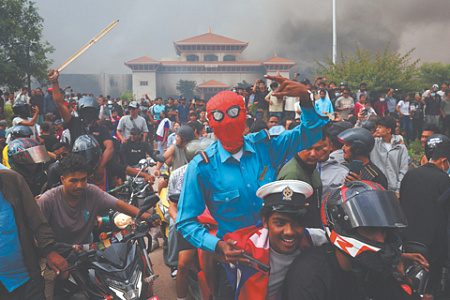
A political crisis has engulfed Nepal, the Himalayan nation famed for Mount Everest, leading to the resignations of both President Ram Chandra Paudel and Prime Minister Pushpa Kamal Dahal. The government’s collapse follows days of violent youth-led protests, initially sparked by a controversial ban on major social media platforms and messaging apps, which left at least 20 people dead and over 400 injured in clashes with police.
The unrest, which saw demonstrators defy a curfew in the capital, Kathmandu, was ignited when the government blocked social networks for failing to register with local authorities. However, the ban served as a tipping point for long-simmering public fury over systemic corruption. Protesters, many between the ages of 13 and 28, pointed to social media as the very place where evidence of the lavish lifestyles of the political elite was shared, contrasting sharply with the struggles of ordinary citizens. “Nepalis are fed up with corruption. We want to save our youth from hardship and force the government to care,” one protester told Reuters.
Nepal is no stranger to political volatility. The 239-year-old monarchy was abolished in 2008, but the transition to a stable republic has been fraught with challenges, with more than a dozen governments cycling through power since. Even after the government reversed its social media ban in an attempt to quell the anger, the protests continued, culminating in the resignations of the country’s top leaders. The United Nations human rights agency expressed shock at the deadly violence and called for a transparent investigation.
The events in Nepal are being watched with intense concern by its powerful neighbor, China, which competes with India for influence in the region. For Beijing, the crisis is particularly alarming as it represents a direct challenge by “Generation Z” to the model of state control over the internet. China operates one of the world’s most sophisticated censorship and surveillance systems, the ‘Great Firewall,’ which it uses to preemptively crush dissent and maintain political stability. The successful popular uprising against internet controls in a neighboring state sets a worrisome precedent.
Ironically, the technological architecture for such state surveillance has, in many cases, been supplied by the West. A bombshell investigation by the Associated Press revealed that over the past 25 years, American tech firms have played a significant role in building China’s tracking state. Companies such as IBM, Dell, Cisco, and Seagate have reportedly sold billions of dollars’ worth of technology to Chinese police and government agencies, providing the tools to monitor internet messages, calls, and movements to identify potential dissidents. While the companies maintain they have complied with all U.S. laws and export controls, the report highlights a deep contradiction in the global technology trade, where tools of freedom and repression often originate from the same source.
